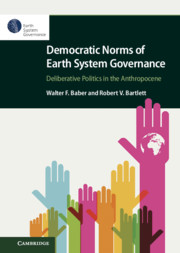Book contents
- Democratic Norms of Earth System Governance
- Democratic Norms of Earth System Governance
- Copyright page
- Contents
- Table
- Acknowledgments
- 1 Democratic Governance in the Anthropocene
- 2 Toward Consensual Earth System Governance
- 3 Empowered Democratic Agency in the Anthropocene
- 4 Embedded Governance Architecture in the Anthropocene
- 5 Experimental Adaptiveness in the Anthropocene
- 6 Equivocal Democratic Accountability in the Anthropocene
- 7 Equitable Access and Allocation in the Anthropocene
- 8 Earth System Democracy
- Afterword
- Notes
- Bibliography
- Index
Afterword
Governance by Uncommon Global Environmental Law?
Published online by Cambridge University Press: 12 August 2021
- Democratic Norms of Earth System Governance
- Democratic Norms of Earth System Governance
- Copyright page
- Contents
- Table
- Acknowledgments
- 1 Democratic Governance in the Anthropocene
- 2 Toward Consensual Earth System Governance
- 3 Empowered Democratic Agency in the Anthropocene
- 4 Embedded Governance Architecture in the Anthropocene
- 5 Experimental Adaptiveness in the Anthropocene
- 6 Equivocal Democratic Accountability in the Anthropocene
- 7 Equitable Access and Allocation in the Anthropocene
- 8 Earth System Democracy
- Afterword
- Notes
- Bibliography
- Index
Summary
Earth system governance is not for the faint of heart. To a considerable extent, governance is a concept that makes sense only within an established legal framework. A plausible argument can be made that no such framework in its modern, constitutional sense even exists outside the confines of the sovereign nation-state (Rabkin 2005). But international law is a complex system of treaties, institutions, and informal governing arrangements that already does exhibit adaptive self-organizing and emergent properties (Kim and Mackey 2014). Greater adaptive capacity might be found, however, by increased reliance on the development of law that is consciously experimental, equivocal, and embedded – a pattern of international law development based on a legal tradition, no less primitive than is contemporary international law, from which emerged a system of law that built an empire and today governs (in whole or part) the lives of nearly 40 percent of the world’s population. This tradition traces the law back, not to scriptural duties or sovereign declarations, but to a gradual and organic accretion of precedent – a process that, more easily than most others, might be imagined as a pattern for the development of global and international law that is truly equivocal, experimental, and embedded.
- Type
- Chapter
- Information
- Democratic Norms of Earth System GovernanceDeliberative Politics in the Anthropocene, pp. 164 - 172Publisher: Cambridge University PressPrint publication year: 2021

